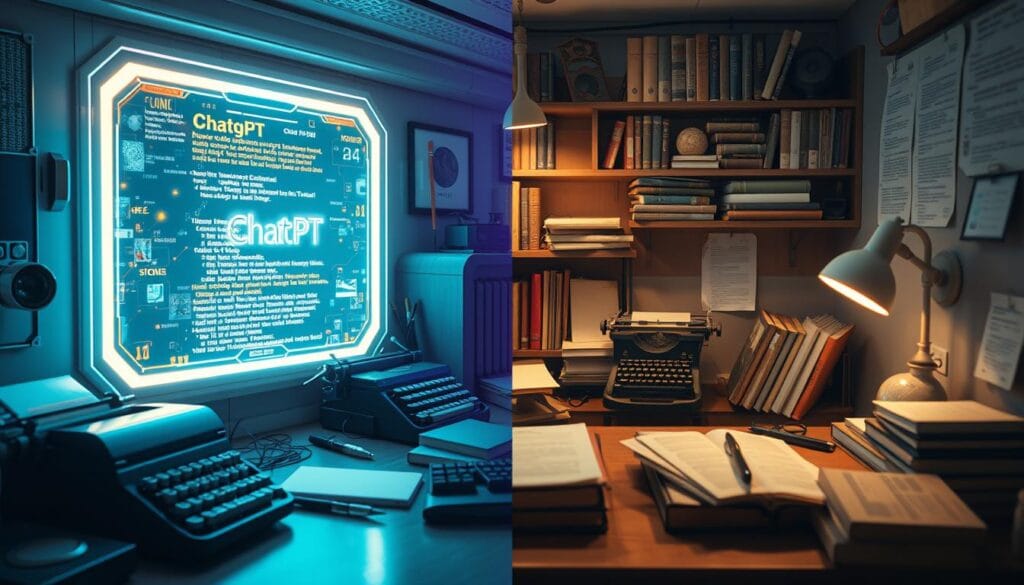“The greatest danger in times of turbulence is not the turbulence; it is to act with yesterday’s logic.” – Peter Drucker. This quote is especially relevant today, as tools like ChatGPT are changing the game for professional writers.
Technology’s rapid advancement is reshaping the writing world. ChatGPT, introduced by OpenAI in late 2022, has sparked interest among writers looking to improve their skills. With around 50% of white-collar workers trying ChatGPT for help, the excitement is clear1. It offers benefits like suggesting article ideas, editing, and serving as a research aid, all while keeping the writer’s voice and creativity intact2. But the question lingers: do professional writers actually use ChatGPT, and how does it fit into their work?
ChatGPT allows writers to speed up content creation and break through creative barriers. This tool not only saves time but also enriches stories with diversity and depth. The key is to use this technology wisely, keeping the human touch alive. This approach helps writers tackle challenges and explore new horizons in the digital era.
Key Takeaways
- Do professional writers use ChatGPT to enhance their writing workflow?
- ChatGPT can significantly boost productivity and creativity for writers.
- About 50% of white-collar professionals have tested ChatGPT in their work tasks.
- The tool aids in overcoming writer’s block and generating new ideas.
- Maintaining a balance between AI assistance and individual writing voice is crucial.
Introduction to ChatGPT in Writing
ChatGPT, a tool powered by OpenAI’s GPT-3 language model, marks a significant leap in writing technology. This ChatGPT overview highlights its capability for conversational dialogue and coherent text creation. It’s versatile, aiding in the production of engaging blog posts and marketing materials, making it crucial for today’s writers.
Overview of ChatGPT
Introduced in November 2022, ChatGPT has dramatically altered content creation. It can generate paragraphs in mere seconds, outpacing traditional writing methods. The average typing speed is around 38-40 words per minute for individuals, while professionals reach 80-90 words per minute. Authors can leverage ChatGPT for up to 75% of their initial drafts, freeing them to concentrate on outlining and refining their work34.
Importance of AI in Modern Writing
The advent of AI in writing heralds a new era, revolutionizing the writing process. AI tools like ChatGPT can handle drafting and idea generation efficiently. This shift is part of a larger trend where AI will increasingly take on writing tasks for businesses. However, it’s essential to note that clear instructions are key to achieving accurate and relevant outputs4.
The Role of AI in Professional Writing

AI technology, especially ChatGPT, significantly impacts professional writing. It boosts creativity, streamlines research, and aids in language. This tool, with its 175 billion parameter language model, generates ideas quickly, matching traditional brainstorming’s efficiency5. It helps writers explore diverse content, overcoming creative hurdles and crafting unique stories.
Enhancing Creativity
AI’s role in boosting creativity is transformative for writers. ChatGPT, with its vast training data of around 500 billion “tokens,” sparks creativity by offering numerous ideas and viewpoints5. This ability allows writers to explore new angles, enhancing their work’s depth.
Streamlining Research Efforts
ChatGPT’s ability to streamline research is invaluable. It offers quick access to information, aiding writers in gathering data efficiently. Additionally, it is crucial for creating key marketing copy and metadata, improving overall content quality6.
Assisting with Language and Style
AI’s language assistance refines written content’s subtleties. ChatGPT excels in creating blog post outlines, ensuring all key points are covered5. This technology helps writers align with their desired tones and styles, ensuring their messages connect with their audience.
Perceptions of ChatGPT Among Writers
As AI writing tools like ChatGPT become more prevalent, writers express a range of views on their role in writing. Many now embrace AI for its ability to boost efficiency without sacrificing quality. This shift is evident in the growing number of professionals using AI to streamline their work.
Trends in Adoption
Studies show that ChatGPT users can finish tasks 40% faster than those without it, highlighting its efficiency7. Moreover, the quality of work generated with ChatGPT’s help is 18% higher, as rated by experts7. A survey of 453 marketers and data analysts found AI’s effectiveness in tasks like press releases and short reports7. This trend indicates a rising acceptance of AI tools among writers, who see past technological hurdles disappearing.
Concerns About Authenticity
However, doubts about AI content authenticity persist. Many writers worry that over-reliance on AI could dilute their unique voice. A legal case involving a lawyer fined for inaccuracies in a ChatGPT-generated legal brief serves as a cautionary tale7. It highlights the need for vigilant monitoring when using AI in professional settings. Additionally, researchers note that while ChatGPT processes information quickly, it lacks the nuanced judgment humans bring to writing8.
Balancing AI with Human Touch
Striking a balance between AI assistance and personal style is crucial. Experienced writers have seen their completion times drop with AI support, while novices have produced higher-quality work with ChatGPT’s aid7. This dual advantage makes a strong case for using AI in a way that respects the human touch. This touch is vital for creative tasks such as storytelling or novel writing8. As the debate around AI tools continues, a collaborative approach that leverages both AI and human writers’ strengths is likely to be the future.
Examples of ChatGPT Usage in the Industry

ChatGPT has become a versatile tool across various industries, showcasing its wide range of applications. Companies are looking for innovative ways to boost productivity and creativity. They turn to this technology for content creation, marketing assistance, and research support.
Content Creation for Blogs
Many writers use ChatGPT for content creation, allowing them to quickly generate ideas and drafts for blog posts. This efficiency lets content creators focus on enhancing their narratives and personalizing their outputs for their audience. ChatGPT can generate personalized content for various writing purposes, helping professionals in journalism, marketing, and academia9.
Generating Marketing Copy
In marketing, organizations use marketing copy AI assistance to create compelling ads and promotional materials. For example, Koo uses ChatGPT models to help users create high-quality content at scale, improving user engagement and content creation efficiency10. ChatGPT’s ability to analyze sentiment and tone makes it invaluable for businesses aiming to understand audience reception and ensure effective messaging.
Assisting in Research and Idea Generation
ChatGPT’s functionality as a research aid with AI allows users to explore topics efficiently. Users can fine-tune ChatGPT with their specific data sets, enabling customization for industry-specific needs or research requirements9. This capability makes ChatGPT a reliable research companion, helping professionals develop new ideas and strategies in a rapidly evolving landscape.
Benefits of Using ChatGPT for Writers
Writers today are embracing technology to improve their craft. ChatGPT offers many benefits, especially in boosting productivity, overcoming writer’s block, and providing diverse views in writing.
Boosting Productivity
ChatGPT can significantly enhance productivity. It efficiently handles initial tasks like creating outlines and generating content ideas. This allows writers to concentrate on developing their unique concepts. Many writers have noted a significant improvement in their daily workflow, saving time and effort11.
Overcoming Writer’s Block
Writer’s block is a common challenge. ChatGPT’s ability to generate prompts and ideas boosts creativity, helping writers overcome this hurdle. Writers feel less intimidated by a blank page, thanks to the AI’s suggestions11.
Access to Diverse Perspectives
ChatGPT also provides access to diverse views in writing. It offers a wide range of perspectives, enriching content and inspiring writers. This exposure to different styles and formats can elevate writing quality, promoting originality12.
Limitations of ChatGPT in Writing

ChatGPT, while a powerful tool, has several limitations for writers to consider. One key area is AI context understanding, where it often fails to capture the subtleties of human communication. This can lead to content that’s either off-topic or factually incorrect, especially in complex areas like health1314. Its inability to convey humor means it’s best suited for informative content, not creative writing that needs a lighter tone15.
Writers must therefore double-check AI-generated content for accuracy and credibility, especially in their specific fields1314.
Plagiarism is another concern due to ChatGPT’s use of existing data, which can result in similar content to other works. Ensuring originality is crucial when reviewing AI output. Additionally, relying too heavily on AI might hinder creativity and uniqueness15. It’s vital for writers to verify and refine ChatGPT’s information, especially in the final stages, to maintain quality13.
Integrating ChatGPT into a Writer’s Workflow

Modern writers are now looking for new ways to boost their writing. Using ChatGPT can change their workflow, making it more dynamic and creative. It’s important to use AI tools well to get the most out of this integration. ChatGPT can help with brainstorming, drafting, and research, leading to better efficiency and creativity.
Tips for Effective Use
Using ChatGPT effectively requires some strategies. It’s crucial to be clear with your prompts to get the right answers. Following rules for using ChatGPT can lead to better results. For example, using a feedback loop can make interactions better and more relevant over time16.
Writers should also be open to new ideas during their sessions. This can make their writing more interesting and diverse.
Combining AI with Traditional Techniques
AI tools have many benefits for writers, but traditional methods are still important. It’s vital to keep your unique voice when using ChatGPT. This means doing thorough proofreading and editing, which can be helped by tools like Grammarly and Textio17.
Using tools for diagram creation can also help writers visualize their ideas. This makes technical writing easier to understand17. By blending traditional skills with AI, writers can handle today’s challenges while staying true to themselves.
Industry Opinions on AI Writing Assistants

The evolution of professional writing has sparked intense discussions about AI writing assistants. Established authors hold diverse views on AI’s role in writing. They see the benefits of AI tools, which can boost creativity, yet worry about losing originality and the heart of storytelling. The debate also touches on job security, especially after recent labor disputes in Hollywood18.
Insights from Established Authors
Writers often share their perspectives on AI’s integration into their work. They value the efficiency of tools like ChatGPT but stress the need for human touch. They fear AI might produce generic content lacking emotional depth19. Moreover, they worry that over-reliance on AI could erode individual authorship and creative freedom.
Perspectives from Editors and Publishers
Editors and publishers see AI writing tools as valuable for streamlining processes. They explore how AI can refine content and expedite production. However, they emphasize the need for human review to maintain quality and message integrity20. The emergence of AI prompts a reevaluation of traditional roles, sparking discussions on new editorial standards.
In the fast-evolving writing landscape, balancing AI capabilities with human creativity is becoming increasingly essential.
Freelancers must now highlight their unique value to stand out from AI-generated content20. This understanding promotes a harmonious relationship between writers and AI technologies.
Future of Writing with AI Support

The future of AI in writing is set to dramatically change the professional authorship landscape. As AI content creation evolves, writer roles will adapt, leading to more teamwork. This shift will redefine how we approach writing.
Evolving Role of Professional Writers
Professional writers will likely focus on high-level concepts, with AI handling the repetitive tasks. Tools like ChatGPT have transformed content creation, making marketing copy, essays, and more quicker to produce21. This integration could boost writer efficiency while preserving creative control. They will act as curators and editors of AI-generated content, ensuring quality and coherence.
Predictions for AI advancements
Experts predict a significant transformation in the writing world soon. AI tools, such as ChatGPT and Microsoft’s Copilot, are advancing rapidly, changing content generation and consumption22. The market is seeing more AI-generated content, creating a need for skilled human authors and editors to maintain quality and authenticity22. In the future, books might highlight human authorship to value creativity and originality, reshaping literary engagement22
ChatGPT versus Other Writing Tools

In today’s fast-paced writing environment, tools like ChatGPT, Scrivener, and Grammarly offer unique advantages for different writing tasks. Each tool has its strengths, and the choice often depends on the writer’s specific needs3.
Comparison with Scrivener
Scrivener excels in organization and structure, making it a top choice for novelists and researchers. It breaks down projects into manageable sections, helping writers stay focused on extensive documents. In contrast, ChatGPT offers a fluid writing experience through real-time text generation.
This speed is unmatched, generating entire paragraphs in seconds. This is a significant advantage over the average typing speed of 38 to 40 words per minute for regular writers3. ChatGPT can enhance Scrivener’s project management by serving as an idea generator and drafting assistant, enriching the writing process.
Evaluating Grammarly Alternatives
Grammarly is renowned for its grammar and style correction skills. This reliability is crucial for maintaining professional writing standards. Yet, ChatGPT stands out by offering conversational text generation and collaborative content creation.
Writers across various fields are interested in AI tools for content creation and translation. This has led to mixed opinions on AI’s role in maintaining quality23. ChatGPT may not have Grammarly’s fine-tuning, but it can help with initial drafts. This allows writers to refine their voice and enhance the narrative.
In creative endeavors, caution is advised. Purist writers caution against relying too heavily on AI. This is to preserve the emotional depth and originality that resonates with readers24.
Ethical Considerations in AI Writing

The rise of AI in writing brings forth critical ethical concerns. Writers must grapple with copyright concerns in AI-generated content, safeguarding the originality of works. It’s vital to stress ethical practices, placing the onus on the user, not the technology.
Copyright Issues
AI tools in writing spark major copyright debates, especially on plagiarism and content similarity. Many educators worry about students using AI for assignments, seeing it as a shortcut to intellectual effort25. Writers must verify their work and give proper credit to prevent plagiarism, especially when submitting AI-generated content as their own25. They should ensure their output reflects their unique style and purpose.
Transparency in Usage
Transparency in AI tools is key to ethical writing. Writers must openly discuss their AI use, building trust with readers. Acknowledging AI’s role in enhancing creativity, not replacing it, is crucial26. By following guidelines like crafting clear prompts and reviewing content, writers uphold ethical standards in AI-assisted writing26. Promoting open dialogue about AI use fosters a culture of ethical awareness in writing.
Reader Reception of AI-Generated Content

Understanding how readers view AI content is crucial for assessing its acceptance. The rise of tools like ChatGPT is reshaping content creation. Yet, it’s important to acknowledge the diverse reactions from the audience. While some welcome this innovation, others doubt the authenticity and quality of AI-generated text.
Trusting AI Generated Material
The trustworthiness of AI-generated content largely depends on its perceived quality. Studies show that AI content, like ChatGPT’s, can seem formulaic and repetitive compared to human writing. This contributes to skepticism about its authenticity27. Coherence and accuracy play significant roles in whether readers accept AI content. The absence of a human touch in AI-generated content can be evident, raising questions about its reliability28.
Impact on Audience Engagement
Engagement with AI content is influenced by how well it connects with readers. Research suggests that optimized AI tools can enhance readability and provide quick responses, boosting audience interaction28. However, readers often seek content that includes personal stories, aligning with Google’s E-A-T principle. This principle emphasizes relatability and originality27. Thus, while AI can grab attention quickly, ensuring the content retains a human touch is key for sustained engagement.
The Impact of ChatGPT on Writing Styles

As writers increasingly integrate AI tools into their workflows, writers experience noticeable writing style changes with AI. This shift leads to the adaptation of tone and voice in written content. Many are prompted to embrace the capabilities of models like ChatGPT. By offering suggestions that stem from vast data, AI encourages a more experimental approach to narrative construction. This impacts how stories are told.
Changes in Tone and Voice
The introduction of AI has transformed the tone and voice in writing, often resulting in a more dynamic style. Writers find that storytelling evolution through AI allows them to experiment with various tones that cater to diverse audiences. This interaction invites authors to revise their existing style, integrating modern elements that resonate with contemporary readers.
The prevalent adaptability of AI-generated suggestions enhances expressive potential. It guides writers to evolve beyond conventional boundaries.
Evolution of Storytelling Techniques
The blending of AI into creative processes influences storytelling techniques significantly. Writers are now focusing on crafting narratives that are not only engaging but also punchy. They intrigue their audiences in a way previously unexploited.
Writing style changes with AI prompt a shift from traditional storytelling to more interactive formats. This encourages renewed engagement strategies. As AI tools refine the structure of narratives, they lend support in synthesizing ideas and enhancing overall coherence. This results in innovative approaches to storytelling.
Case Studies of Successful AI Integration

The integration of AI technologies, such as ChatGPT, has dramatically changed the landscape for media companies and freelancers. These AI integration case studies show how AI boosts productivity and creativity in various writing tasks.
Notable Examples from Media Companies
Media companies leveraging ChatGPT have transformed their content creation processes. They’ve used AI to produce articles quicker and more efficiently, ensuring timely delivery of engaging content. Real-world examples highlight how AI aids in brainstorming and organizing ideas, leading to more compelling storytelling.
Freelancers Leveraging AI Tools
Freelancers and AI tools have formed a powerful partnership, giving them an advantage in competitive markets. By using AI like ChatGPT, writers can streamline their workflows, efficiently creating diverse content. This partnership empowers freelancers to differentiate themselves, exploring various stylistic options that enhance their creative output. It not only helps overcome writer’s block but also increases productivity, opening up new avenues for content variety.
These experiences showcase AI’s transformative potential across different writing fields. The case studies not only highlight significant achievements but also encourage further research into AI’s ongoing implications and future possibilities in writing293031.
Resources for Writers Interested in ChatGPT

For writers looking to use ChatGPT, a wealth of resources is available. These include online courses on AI writing and writer communities for AI support. Courses offer in-depth training on using ChatGPT, improving creativity and productivity. They also cover the basics of AI.
Online Courses and Tutorials
Writers can find online courses on AI writing that delve into ChatGPT’s capabilities. These courses provide insights into its features. They guide participants through practical workshops to enhance their writing skills.
For instance, some tutorials show how ChatGPT can create outlines or help with content creation. This encourages writers to explore new ways of working.
Communities and Forums for Support
Joining writers communities for AI support can greatly benefit a writer’s experience with ChatGPT. Forums are great for sharing tips, experiences, and feedback. They also offer a chance to connect with others facing similar challenges.
These communities promote learning together and provide a space to discuss best practices and potential issues in AI-assisted writing.
Conclusion: The Future of Professional Writing
The writing landscape is rapidly changing, with technology playing a key role. The advent of AI, especially tools like ChatGPT, opens up new avenues for writers. It allows them to boost their productivity and creativity. By using AI for SEO-optimized content and complex topics, writers can refine their workflow. This enables them to concentrate on their unique voice in content creation3233.
Embracing Technology in Writing
ChatGPT and other advanced AI have revolutionized writing tasks. They can generate drafts swiftly and help in brainstorming. This makes technology a valuable partner, not a rival. Yet, it’s crucial to remember that human insight remains essential. It enriches storytelling and content creation, making it more complex and engaging3433.
Balancing AI and Human Insight
Writers must now balance AI’s help with their own unique perspectives. AI brings efficiency, but the heart of compelling writing lies in human experiences. As the writing world evolves, embracing AI while maintaining individuality is vital. This balance will be key to success in the future of writing with AI3234.
FAQ
Do professional writers use ChatGPT in their workflow?
What are some benefits of using ChatGPT for writing?
What concerns do writers have about using AI tools like ChatGPT?
How does ChatGPT help with language and style?
What are the limitations of ChatGPT?
How can writers effectively integrate ChatGPT into their writing process?
What do established authors think about AI writing assistants?
How does ChatGPT compare to other writing tools like Scrivener and Grammarly?
What ethical considerations arise from the use of AI writing tools?
How do readers perceive AI-generated content?
Can ChatGPT influence traditional writing styles?
Are there resources available for writers interested in using ChatGPT?
Source Links
- ChatGPT: how to prevent it becoming a nightmare for professional writers
- Ten Ways For Writers To Use ChatGPT
- ChatGPT VS Professional Writers: Who Creates Better Copy?
- How to write using ChatGPT
- When you SHOULD and SHOULDN’T use ChatGPT as a professional writer.
- ChatGPT and Publishing: 3 Ways Publishers Are Responding to AI — Alyssa Matesic | Professional Book and Novel Editing
- ChatGPT can turn bad writers into better ones
- Chat GPT Looks Set To Stay — Should Writers Be Worried? – Clarity Global
- The Best Examples Of What You Can Do With ChatGPT
- 50 ChatGPT Use Cases with Real-Life Examples
- ChatGPT Is a Game-Changer. Here’s How to Use it in Your Writing.
- ChatGPT for Writers: Ethical Dilemma or Game-Changer? — Nicole Paulus
- I cracked the code to writing with ChatGPT. Here’s how you can too…
- 6 key limitations of ChatGPT
- 3 Limitations and 3 Benefits of Using ChatGPT — Nicole Paulus
- How To Prompt ChatGPT Like A Professional Writer: 7 Key Rules
- Maximizing ChatGPT for Technical Writing
- Five Hollywood writers discuss AI’s impact on their careers
- The Pros and Cons of AI Resume (ChatGPT vs. Expert Writers)
- What freelance writers need to know about AI and ChatGPT
- Should I Use ChatGPT to Write My Essays? – Harvard Summer School
- Writers & Editors, Do Not Despair! AI And The Future Of Writing, Editing, And Publishing by Dan Cross – Pen To Print
- What I Think About ChatGPT and Other AI Writing Tools – Kenna Griffin
- ChatGPT is a Terrible Writer (And why that’s not such a bad thing)
- Ethical use of AI in writing assignments
- Using AI in Writing: Ethical Implications and Personal Responsibility
- How To Avoid AI Detection As A Writer – Originality.AI
- AI-Generated Content and ChatGPT: A Complete Guide
- Tepper School Expert Advocates for AI Integration in Business Writing Instruction – Tepper School of Business – Carnegie Mellon University
- Can ChatGPT edit fiction? 4 professional editors asked AI to do their job – and it ruined their short story – RealKM
- Top 10 AI Case Study Writers for Stellar Case Studies
- Should Writers Fear Chat GPT? – America’s Future
- ChatGPT: The Future of Writing and What it Means for Writers | In Plain English
- ChatGPT and the Near Future of College Writing







